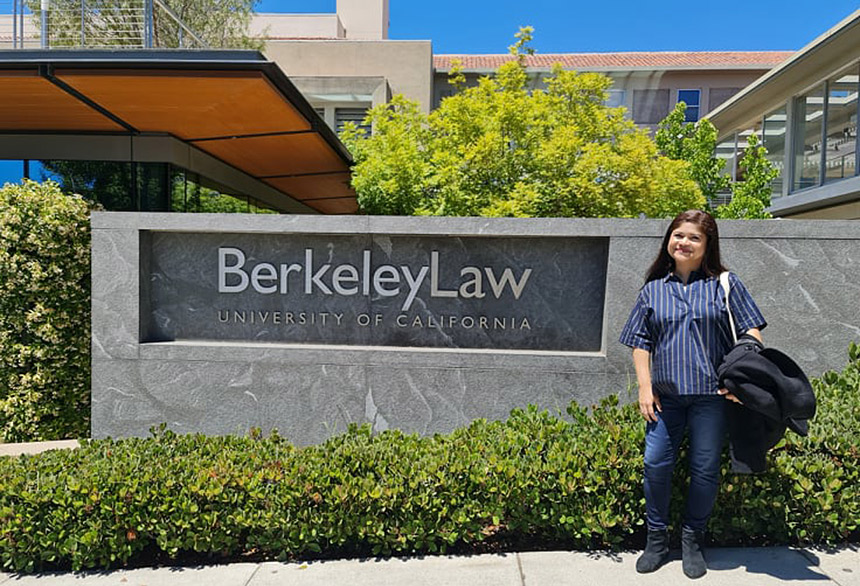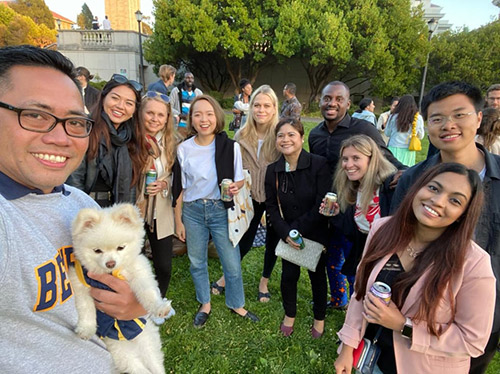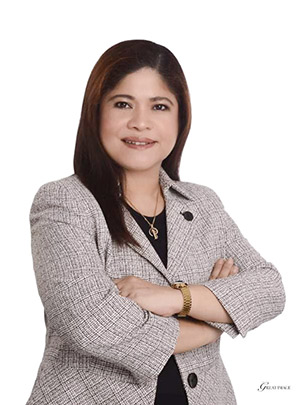
By Andrew Cohen
As president of the University of Northeastern Philippines and its law school dean, Remelisa Moraleda had bountiful options to advance her own legal education.
“I chose Berkeley Law for my LL.M. degree because it’s the only top-ranked law school that offered a program convenient for foreign practicing lawyers,” she says. “I had scoured the top 10 law schools every year since 2012 for a similar program, but couldn’t find one that worked for my situation being a mother to very young kids. I also find the curricular offerings to be more diverse and relevant in these times.”
Now finishing Berkeley Law’s executive track LL.M., Moraleda spent last summer on campus sandwiched between the spring and current fall semester studying remotely. Designed to be compatible with a busy work schedule or personal commitments, the online semesters each take about 15 hours of work each week or less while the summer semester is full-time onsite.

“Aside from the discussions with professors who truly are experts in their fields, I found the opportunities for cultural and social exchange between students from all parts of the globe to be a great bonus,” Moraleda says. “And Berkeley is the best place to be because there’s so much to see just in and around campus — Tilden Park, food from all over the world, warm and welcoming locals. Berkeley people are courteous and respectful and I really appreciate them.”
Moraleda comes from a family of lawyers and educators. She worked in law firms for three years before entering academia, and still practices in a reduced capacity while juggling her ample university responsibilities. Currently, she manages a small office that handles general practice and legal counseling.
Appointed the University of Northeastern Philippines’ law school dean in 2010, Moraleda takes “delight in seeing law students understand a difficult concept of law and apply it in real world scenarios.”
She had long dreamed of studying for her law master’s degree in the United States, but the Philippines’ Legal Education Board pushed her into action when it recently required lawyers to have an LL.M. degree before becoming a law professor or a law dean.
“There’s an exception for those who were law professors for at least 10 years before the requirement took effect, and I actually fall into the exception. However, I believe in having an advanced degree if one wants a career in the academy, and I felt that I owe it to my students to have this degree to be an effective professor and law dean,” Moraleda says. “It’s that desire to learn more, to be able to teach more, that finally prompted me to pursue an LL.M. degree.”
Longtime leader
President of her university for 17 years, Moraleda has had five-year terms renewed three times. Established in 1948 by her grandparents, the school offers preschool, elementary, junior high, high school, undergraduate, and graduate school advanced degrees.
Starting in 2016, Moraleda navigated a challenging transition from the Philippines’ K-10 system to its current K-12 model. But COVID-19 presented an even tougher hurdle.

“We were able to continue with our services despite the limitations we faced,” she says. “Unlike in the United States, the Philippines is still struggling with connectivity — more so in our region where only the urban areas are digitally connected — and even so the connection is still unreliable.”
Her school provided printed modules that students picked up, and held weekly online follow-up sessions with them in low bandwidth modalities on social media sites like Facebook, which is available via free data in the Philippines.
“Despite all these challenges, we were able to maintain and progress in our accreditation status with quality assurance agencies,” Moraleda says.
Because the Philippines is a civil law country with only one judicial hierarchy, Moraleda finds legal practice there more simple than in the U.S., which is built from a common law foundation and features multiple jurisdictions.
As for legal education, her summer in Berkeley presented more opportunities for classroom discussion and debate, which she says makes learning more engaging and enriching. While students in the U.S. simply need to “apply critical thinking and analytical skills,” Moraleda says that’s not the case in the Philippines, where they must conduct their own time-consuming research on legal concepts.
“This is understandable since most of the legal concepts and procedures are conceived in the U.S., which has a longer legal history than the Philippines,” she says. “Berkeley Law’s instructors make sure that the materials we’re asked to read are already pared down to the essentials. Casebooks are well-written and assigned articles are relevant and on point.”
Combined with the personal friendships, professional connections, and meaningful memories she made in Berkeley Law’s LL.M. program, Moraleda says, “It was the most enriching and enjoyable summer I’ve experienced in a long time.”